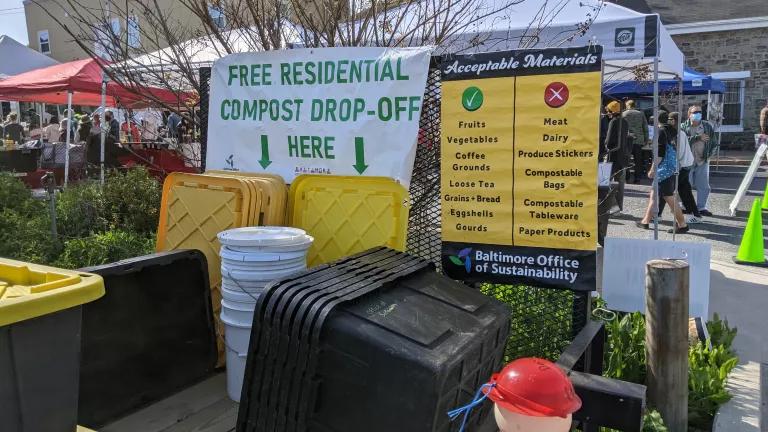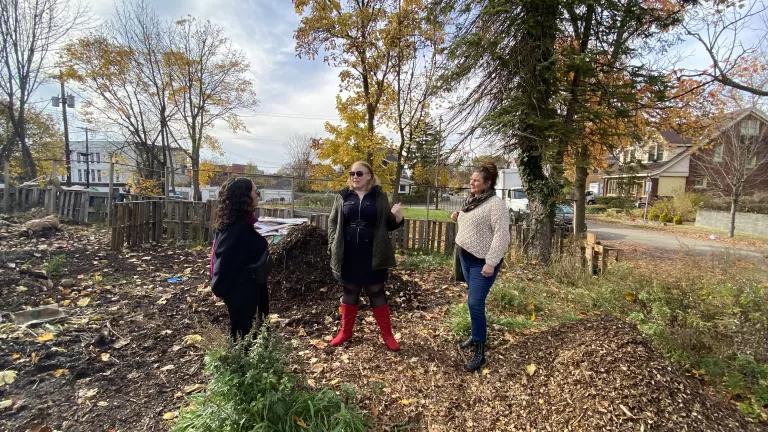Celebrating Year One of the Food Matters Regional Initiative
A year after the launch of the Food Matters Regional Initiative, we are pleased to report considerable progress and accomplishments from the 15 regional initiative participants.

32nd Street farmers market drop-off in Baltimore
In July 2020, NRDC launched our first two cohorts of the Food Matters Regional Initiative. This initiative expanded on our previous experience working at the city level to bring together cities located in the same geographical area, with the goal of creating synergies and shared learnings to influence large-scale reductions in food waste at a regional level. In January 2021, we added another cohort to the initiative. A year after the launch, we are pleased to report considerable progress and accomplishments from the 15 regional initiative participants. The participants in each regional cohort are:
Great Lakes |
Mid-Atlantic |
Southeast |
| Chicago, IL | Baltimore, MD | Asheville, NC |
| Cincinnati, OH | Jersey City, NJ | Atlanta, GA |
| Detroit, MI (Make Food Not Waste) | Philadelphia, PA | Memphis, TN (Clean Memphis) |
| Madison, WI | Pittsburgh, PA | Nashville, TN (Nashville Food Waste Initiative) |
| Franklin County, OH (Solid Waste Authority of Central Ohio) | Washington, DC | Orlando, FL |
Through the Food Matters initiative, we work with cities, counties, and local organizations to implement specific food waste prevention, food rescue, and food scrap composting strategies within a two- to three-year period, with the goal of ensuring that these city food waste initiatives have the momentum and support they need to continue meaningful progress on food waste reduction after the Food Matters partnership ends. A key component of the initiative is to provide opportunities for cities to share and adapt strategies to avoid “reinventing the wheel.” We help cities to connect by hosting monthly regional cohort calls and developing additional learning opportunities.
Participants in the cohorts have chosen 4-7 strategies to implement with technical support from NRDC. These strategies were chosen because they span the entire food waste hierarchy and provide a menu of options for cities so that we can meet each city where they are on food waste reduction. The strategies include:
- Policy: Enact city ordinance or official act by the Mayor or City Council and/or adjust city-level policy related to food waste.
- Audits: Conduct a food waste audit of government food service operations and/or provide technical assistance for food businesses/institutions to conduct food waste audits.
- Composting: Implement organics waste collection at city offices and city-leased properties and/or establish drop-off locations for food scraps and work with community to process.
- Prevention: Include food waste prevention messaging in existing literature distribution and on website and/or use Save the Food ads in public spaces.
- Business engagement: Sponsor a food waste “challenge” to engage businesses.
- Health inspectors: Conduct health inspector training and distribute information to food businesses encouraging food donation and prevention from food facilities.
- Food rescue assessment: Conduct a food rescue assessment of partners and gaps in infrastructure and/or conduct a food rescue client survey.
As part of the engagement, we are collaborating with cities to report on metrics and progress related to their strategy implementation. Some highlights of our first year’s progress include:
- 8 proclamations have been issued or are pending, committing these cities to addressing the issue of food waste. The regional initiative participating cities which have issued mayoral proclamations are Asheville, Memphis, Orlando, Pittsburgh, Washington DC, Philadelphia, and Cincinnati, with Madison’s on the way. Mayoral proclamations are key tools in reinforcing a city’s commitment to and leadership on food waste reduction.
- 11 of our cohort members signed on to support the US Food Loss and Waste Action Plan, which NRDC developed in conjunction with other partner organizations working on food waste reduction, and which lays out a roadmap for federal action on food waste. Support for the Plan from cities demonstrates the eagerness that exists to address food waste in diverse geographies.
- So far, participants have conducted 18 food waste audits at different city facilities, with the goal of learning more about what and how food waste is generated in these facilities. This knowledge will help the cities identify opportunities to implement tailored strategies to prevent food waste, rescue food, and/or compost food scraps at these facilities.
- At least 12 food scrap recycling community collection and/or drop-off programs have been developed or are underway. The food scraps collected will be processed into compost and distributed locally to improve soils.
- All 15 participants are already working on or teeing up consumer-facing food waste prevention messaging campaigns tailored to their cities. Households are the #1 generators of food waste, and their engagement is critical to the overall reduction of food waste.
- 9 cities or counties are already or beginning to engage foodservice businesses in their cities, through food waste reduction challenges and other mechanisms. As restaurants are the second highest-estimated generating sector of food waste in most cities, engaging restaurants through sector-wide efforts can have broad food waste reduction benefits (including reaching customers and suppliers).
- 7 cities have developed partnerships with city/county health departments with the goal of engaging health inspectors to provide outreach materials on food waste prevention tactics and safe food donation to food facilities.
- We recently added the option to conduct a food rescue assessment or survey; 11 cities are considering adopting this strategy going into year 2. Assessing the local landscape related to food rescue stakeholders and how food moves through a city can be a helpful strategy for cities to identify gaps, opportunities and barriers to ensuring that high quality surplus food is getting rescued and redistributed instead of disposed.
In total, the participants in the Food Matters Regional Initiative are implementing over 79 city strategies. To support this work, the cities formed 18 different working groups to tackle food waste, have held over 50 community events or workshops, and are engaging at least 49 government agencies or departments along with over 500 local and regional stakeholders.
We are incredibly impressed with what the Food Matters Regional Initiative participants have accomplished so far, especially given the challenges of embarking on a new initiative during a global pandemic. NRDC will continue to provide tools and resources to support this work, and we look forward to expanded implementation, deeper engagement, and more new learnings from these partnerships in year two of the initiative.





